The world of naval warfare has witnessed the emergence of some truly remarkable vessels known as aircraft carriers. These floating air bases have revolutionized the defense systems of several countries and have become symbols of prestige and power for global navies.
In this comprehensive guide, we will explore the top 15 best aircraft carriers in the world, their capabilities, and the nations that operate them.
1. USS Gerald R Ford Class (CVN-78)
The USS Gerald R Ford Class is undeniably the biggest and most technologically advanced aircraft carrier in the world. Commissioned in May 2017, the lead ship of this class, USS Gerald R. Ford, has set new benchmarks in naval warfare.
Must Read: Top 9 Intelligence Agencies of US
With a length of 337 meters and a beam of 78 meters, the USS Gerald R Ford Class carriers feature a total load displacement of 100,000 tons. The flight deck, spanning an impressive 78 meters, is equipped with an electromagnetic aircraft launch system and advanced arresting gear.
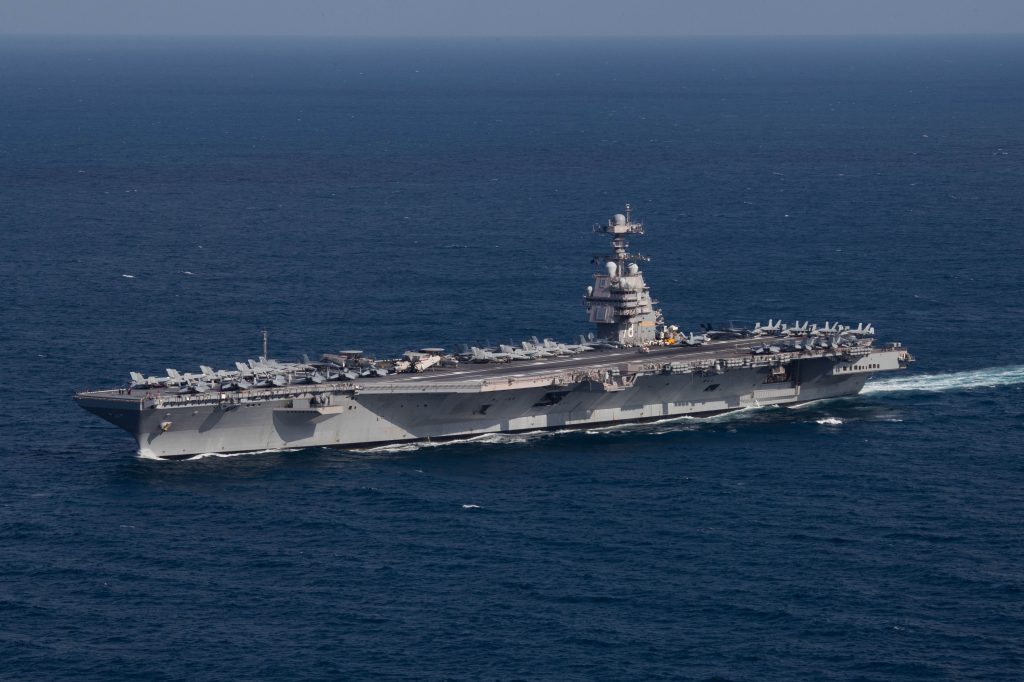
The USS Gerald R. Ford can carry over 75 aircraft and accommodate a total of 4,539 personnel. Powered by two nuclear reactors, it boasts an array of formidable armaments, including RIM-162 Evolved Sea Sparrow missiles, Airframe Missiles, and Phalanx close-in weapon systems (CIWS).
The USS Gerald R Ford Class carriers are a testament to the cutting-edge technology and engineering prowess of the United States Navy.
5 Best Attack Submarines in the World
2. Nimitz Class, USA
The Nimitz Class aircraft carriers, with their impressive size and capabilities, rank as the second-largest aircraft carriers in the world. Named after Fleet Admiral Chester W. Nimitz, the World War II US Pacific Fleet commander, these nuclear-powered carriers have been the backbone of the US Navy for several decades.
The lead ship of this class, USS Nimitz, was launched in May 1975, and the tenth and final ship, USS George H.W. Bush, was commissioned in January 2009.
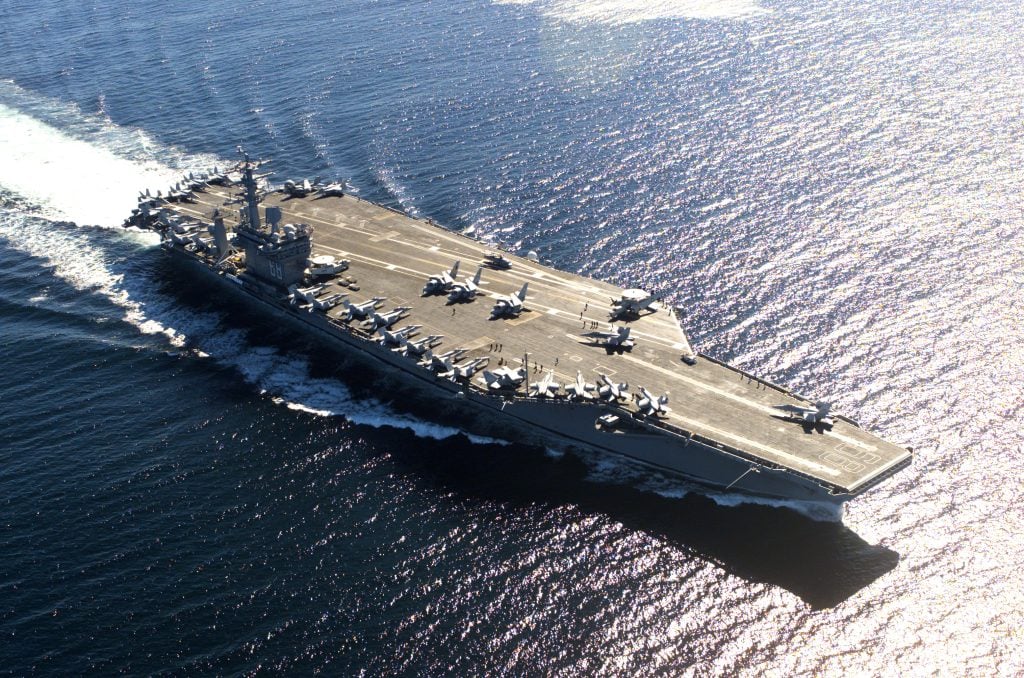
With a total load displacement of 97,000 tons, the Nimitz Class carriers measure 332.8 meters in length and boast a 4.5-acre flight deck capable of carrying over 60 aircraft. These carriers can accommodate a ship company of 3,000 to 3,200 personnel, along with 1,500 air wings and 500 other crew members.
Powered by two nuclear reactors, the Nimitz Class carriers can reach speeds of over 30 knots. These carriers have played a pivotal role in maintaining the United States’ naval supremacy.
11 Best Sniper Rifles in the World
3. Queen Elizabeth Class, UK
The Queen Elizabeth Class aircraft carriers are the largest warships ever built for the UK Royal Navy and rank as the third-largest aircraft carriers in the world. These state-of-the-art vessels represent a new era of naval power for the United Kingdom.
The first carrier of this class, HMS Queen Elizabeth, was commissioned in December 2017, followed by HMS Prince of Wales in December 2019.
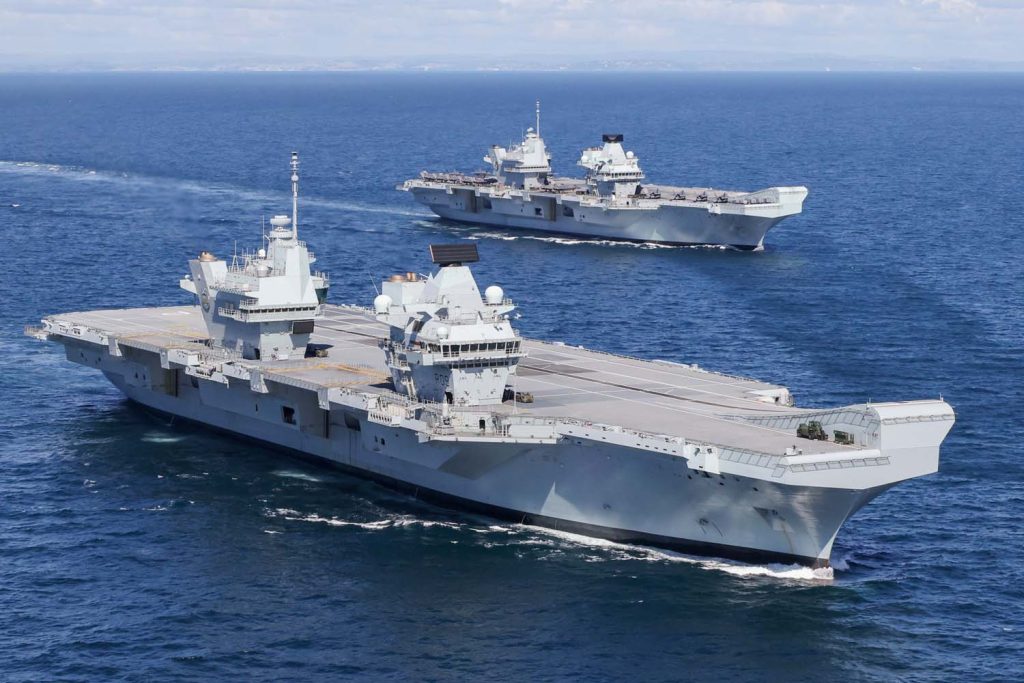
With a displacement of around 65,000 tonnes and a length of 280 meters, the Queen Elizabeth Class carriers are truly impressive. These carriers can embark on up to 40 rotary and fixed-wing aircraft, including 36 F-35B jets and four Merlin helicopters.
Equipped with the latest technology and automated systems, these carriers require a relatively small crew of 679 personnel for combat operations. The Queen Elizabeth Class carriers signify the UK’s commitment to maintaining a formidable naval presence on the global stage.
4. Fujian, China
China’s emergence as a global naval power is evident in its development of advanced aircraft carriers. The nation’s third aircraft carrier, Fujian, was launched on June 17, 2022, and has propelled China to become the country with the highest number of aircraft carriers in the world, after the United States.
Named after the eastern coastal province of Fujian, this indigenous aircraft carrier, also known as Type 003, is more technologically advanced and efficient than its predecessors.
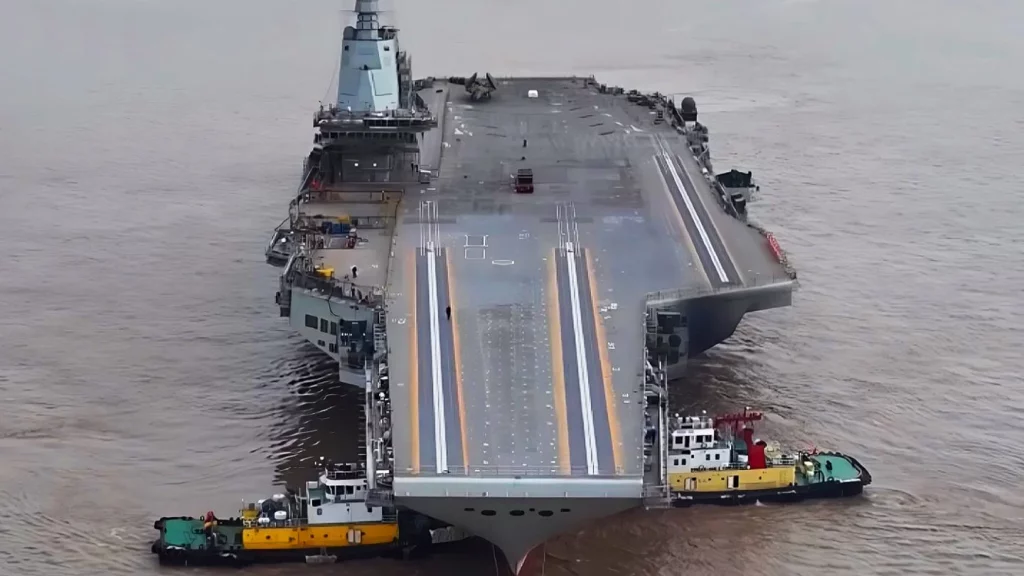
With a full-load displacement of around 80,000 tonnes, Fujian measures 316 meters in length and has a beam of 76 meters. It is equipped with an electromagnetic catapult for launching aircraft from the deck, a significant upgrade from the ski ramp used by China’s previous carriers, Liaoning and Shandong.
Fujian features a flat-top flight deck for smooth take-offs and landings, and it can carry a wide range of aircraft, including fighters and helicopters. This technological marvel showcases China’s ambition to establish itself as a dominant naval power.
Top 5 Fastest Missiles in the World
5. Liaoning, China
The Liaoning, China’s first aircraft carrier, holds a significant place in the nation’s naval history. Originally planned as the second Kuznetsov-class aircraft carrier for the Soviet Navy, this vessel was later purchased by China after the dissolution of the Soviet Union in 1991.
With an overall length of 304.5 meters and an overall beam of 75 meters, Liaoning is the fourth-largest aircraft carrier in the world.
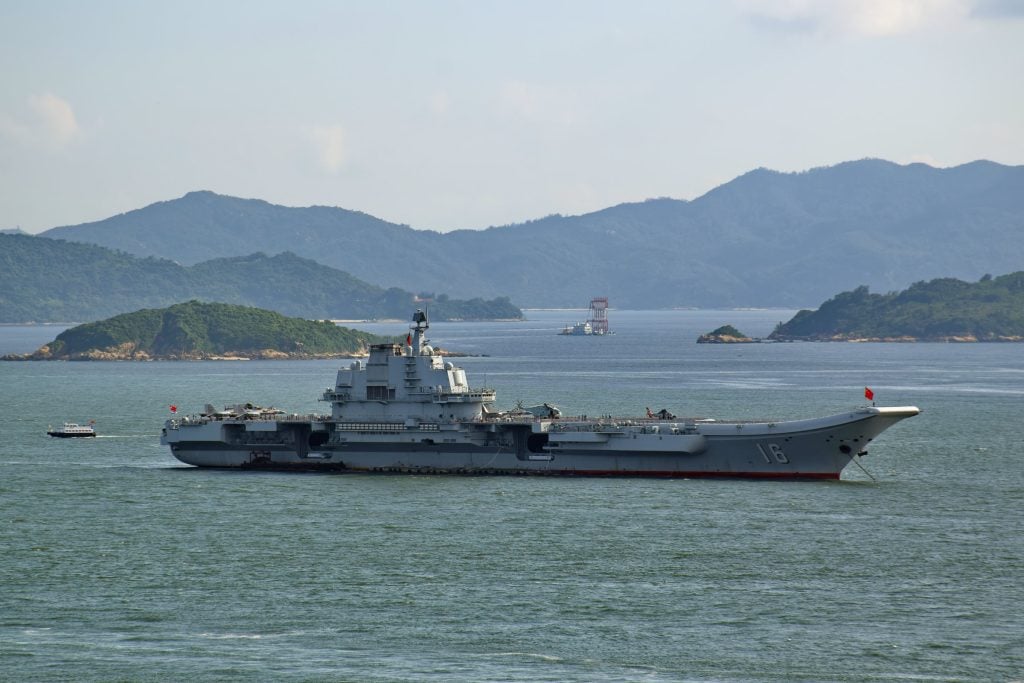
Commissioned for the People’s Liberation Army Navy (PLAN) in September 2012, Liaoning serves as a training ship, providing a platform for the Navy to experiment, train, and familiarize itself with aircraft carrier operations.
This carrier has a full-load displacement of over 58,000 tons and can carry approximately 50 aircraft, including fixed-wing planes and helicopters. The Liaoning has played a pivotal role in enhancing China’s naval capabilities and asserting its presence in the Asia-Pacific region.
All Submarines of the Indian Navy
6. Shandong, China
China’s second aircraft carrier, Shandong, represents a significant milestone in the nation’s naval strategy. Launched on April 26, 2017, Shandong is China’s first domestically built carrier, marking a significant step toward achieving self-sufficiency in naval technology.
While similar in size to its predecessor, Liaoning, Shandong incorporates more advanced technology and notable equipment, making it China’s lead aircraft carrier.
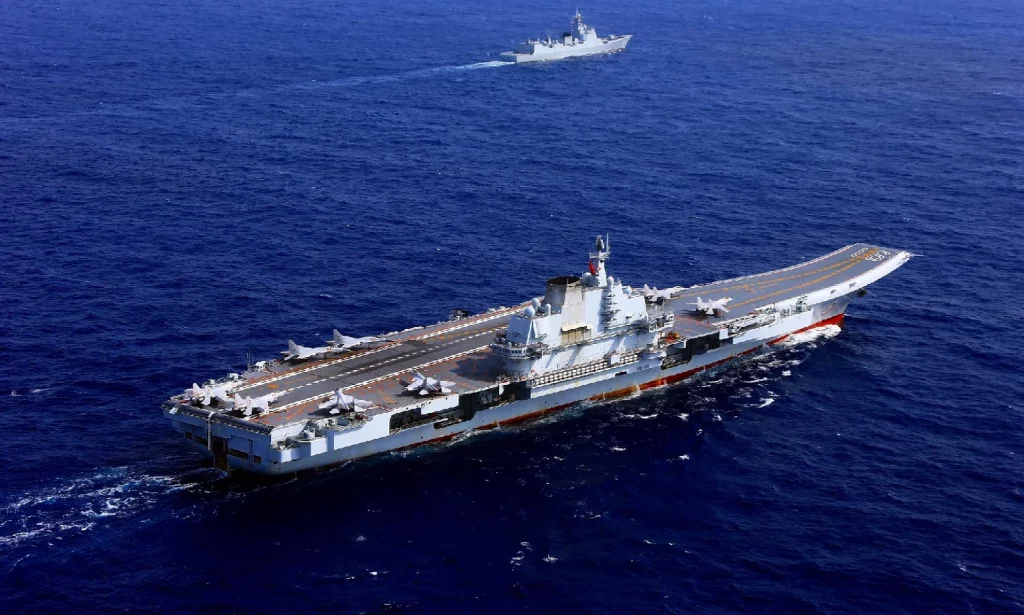
Measuring 305 meters in length and boasting a beam of 75 meters, Shandong has a total load displacement of 70,000 tons. It can carry a maximum of 44 aircraft on its deck, significantly expanding China’s naval aviation capabilities.
Shandong utilizes a Short Take-Off But Arrested Recovery (STOBAR) system to launch and recover aircraft. Equipped with advanced technology, Shandong showcases China’s determination to become a dominant maritime power.
Also Read: 10 Best Assault Rifles in the World
7. Admiral Kuznetsov, Russia
Russia’s Admiral Kuznetsov aircraft carrier is a formidable vessel that serves as the flagship of the Russian Navy. With a length of 305 meters and a beam of 72 meters, this aircraft carrier has a full load displacement of 58,500 tons.
Admiral Kuznetsov is renowned for its multi-role capacity, allowing it to serve as an aircraft carrier while also possessing a wide array of armaments.
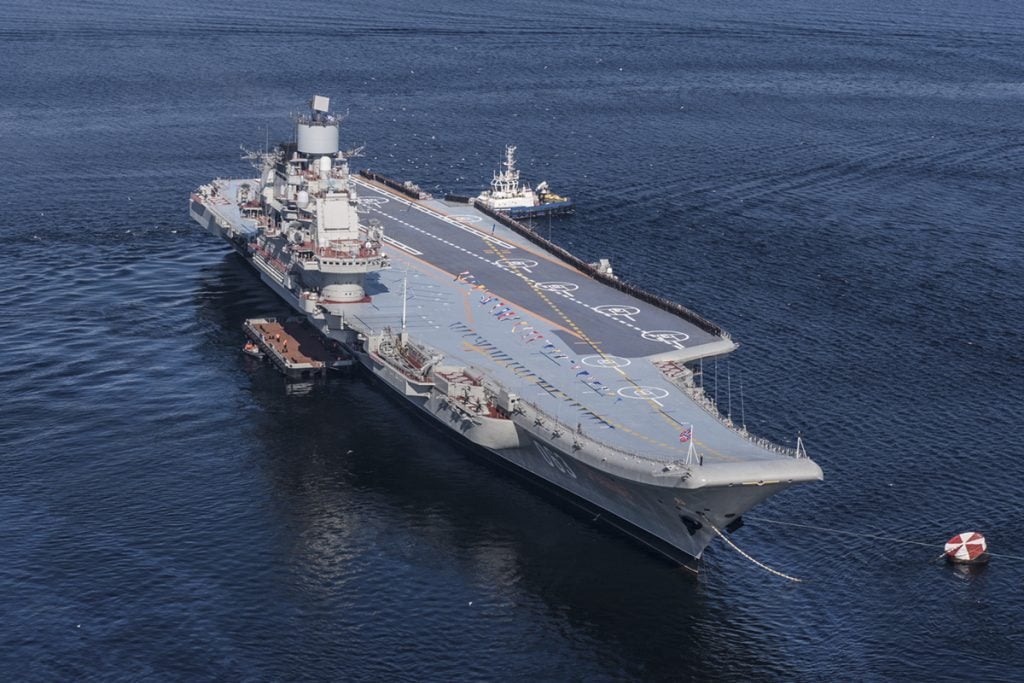
The flight deck of the Admiral Kuznetsov spans an impressive 14,700 square meters and can carry up to 33 fixed-wing aircraft and 12 helicopters. The carrier accommodates a range of aircraft, including Su-33, MiG-29K, and Su-25UTG/UBP STOVL fighters, as well as several types of helicopters.
With a crew capacity of 1,960 personnel, including ship companies, air groups, and flagstaffs, Admiral Kuznetsov plays a crucial role in bolstering Russia’s naval capabilities.
8. INS Vikrant, India
INS Vikrant, India’s indigenous aircraft carrier, is a testament to the nation’s technological prowess and its commitment to strengthening its naval capabilities.
Constructed in the Cochin Shipyard Limited, INS Vikrant completed its sea trials and is set to be commissioned in the coming months (August 2022). The project cost for this carrier was approximately US$3.1 billion.
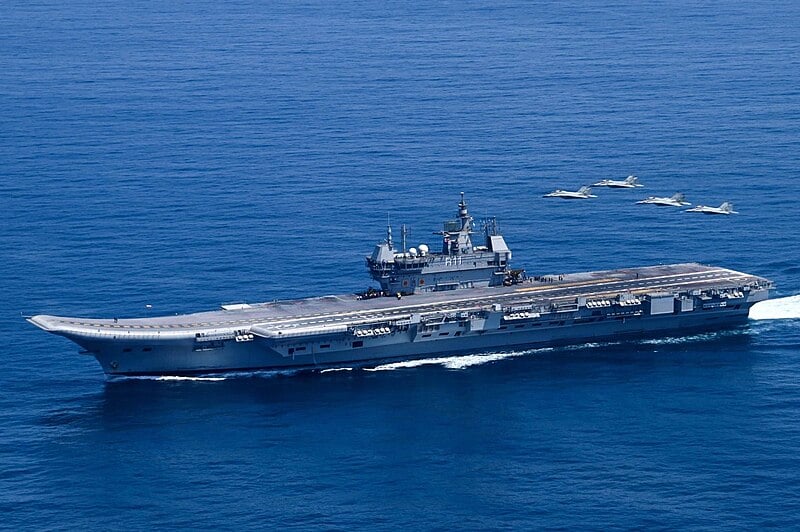
With a loaded displacement of around 45,000 tons, INS Vikrant measures 262 meters in length and 59 meters in width (beam). While INS Vikramaditya is larger in dimensions, INS Vikrant boasts more advanced technology.
This carrier can carry a maximum of 40 aircraft on its deck, significantly expanding India’s naval aviation capabilities. INS Vikrant represents a significant milestone in India’s journey toward becoming a prominent maritime power.
9. Charles De Gaulle, France
France’s Charles De Gaulle aircraft carrier holds a special place in the nation’s naval fleet. Commissioned in 2001, this nuclear-powered surface ship is one of France’s most important carriers.
With a displacement of 42,500 tonnes and a length of 261.5 meters, Charles De Gaulle can carry up to 40 fixed-wing aircraft and helicopters.
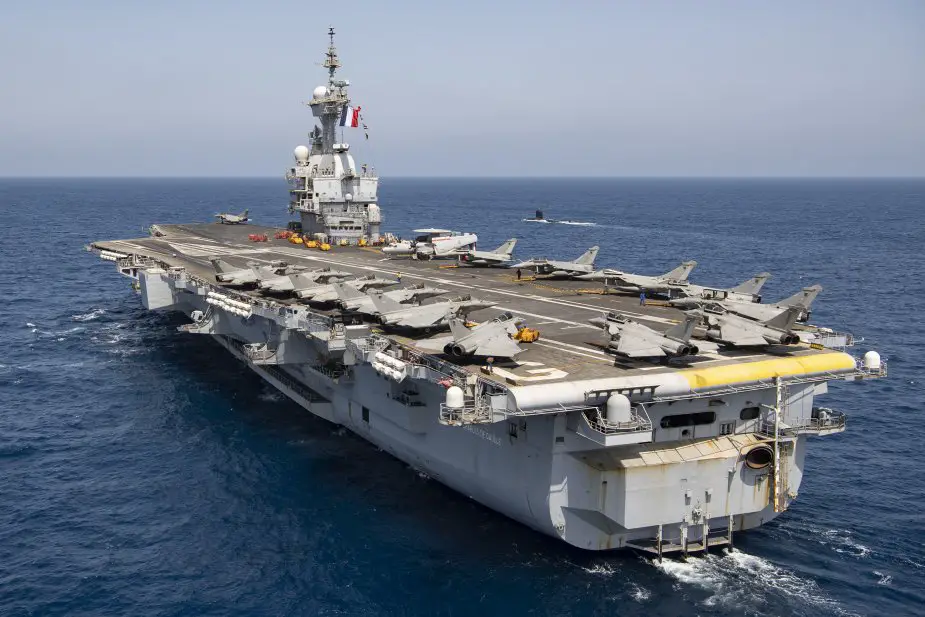
Equipped with a range of aircraft, including Rafale M, E-2C Hawkeye, Super Étendard, EC725 Caracal, AS532 Cougar, and SA365 Dauphin, Charles De Gaulle showcases France’s commitment to maintaining a versatile and combat-ready naval presence.
This carrier’s design emphasizes versatility and stealth, making it a highly capable vessel for both assault and transport roles. Charles De Gaulle serves as a symbol of France’s naval power and its commitment to global security.
10. INS Vikramaditya, India
INS Vikramaditya, the largest warship in the Indian Navy, ranks among the world’s biggest aircraft carriers. This impressive vessel, with a length of 283.5 meters and a beam of 61 meters, is a modified Kiev-class carrier that entered service in 2013.
Previously serving the Soviet Navy and the Russian Navy as Baku and Admiral Gorshkov, respectively, India purchased this carrier in January 2004.
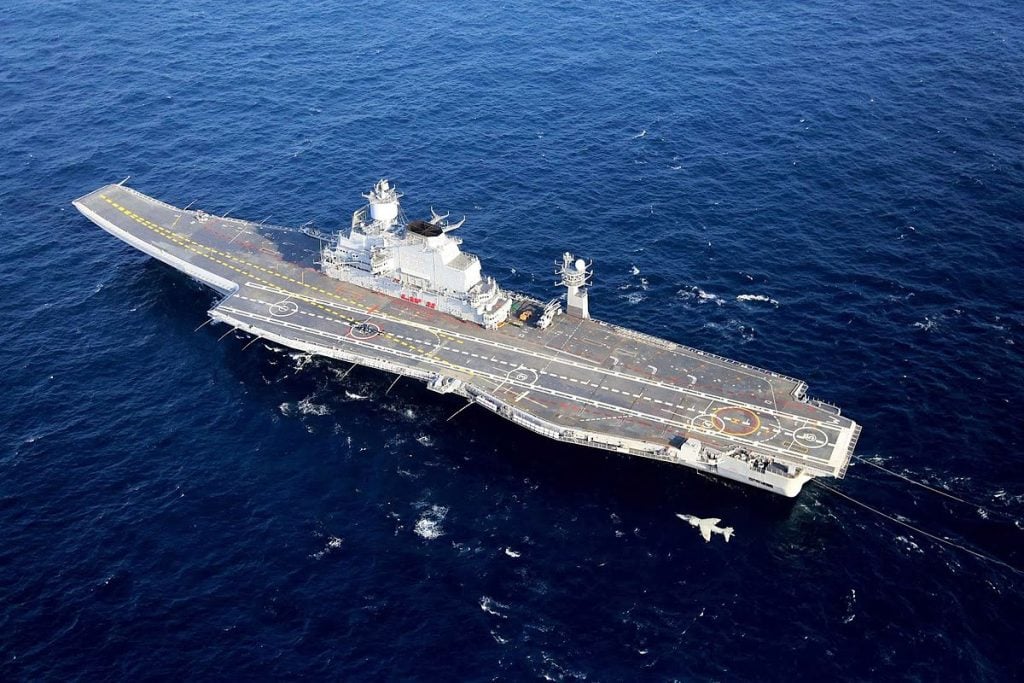
With a displacement of 45,400 tons, INS Vikramaditya can carry a maximum of 36 aircraft, including 26 Mikoyan MiG-29K multi-role fighters and 10 Kamov Ka-31 AEW&C and Kamov Ka-28 ASW helicopters.
This carrier significantly enhances India’s naval aviation capabilities, allowing for a robust defense strategy and power projection. INS Vikramaditya represents India’s commitment to maintaining a strong and capable naval force.
11. Cavour, Italy
The Cavour aircraft carrier, the flagship of the Italian Navy, is a significant asset to Italy’s naval capabilities. With a full-load displacement of 30,000 tons, Cavour features several defense systems, including short-range defense systems, guns, and decoy launchers.
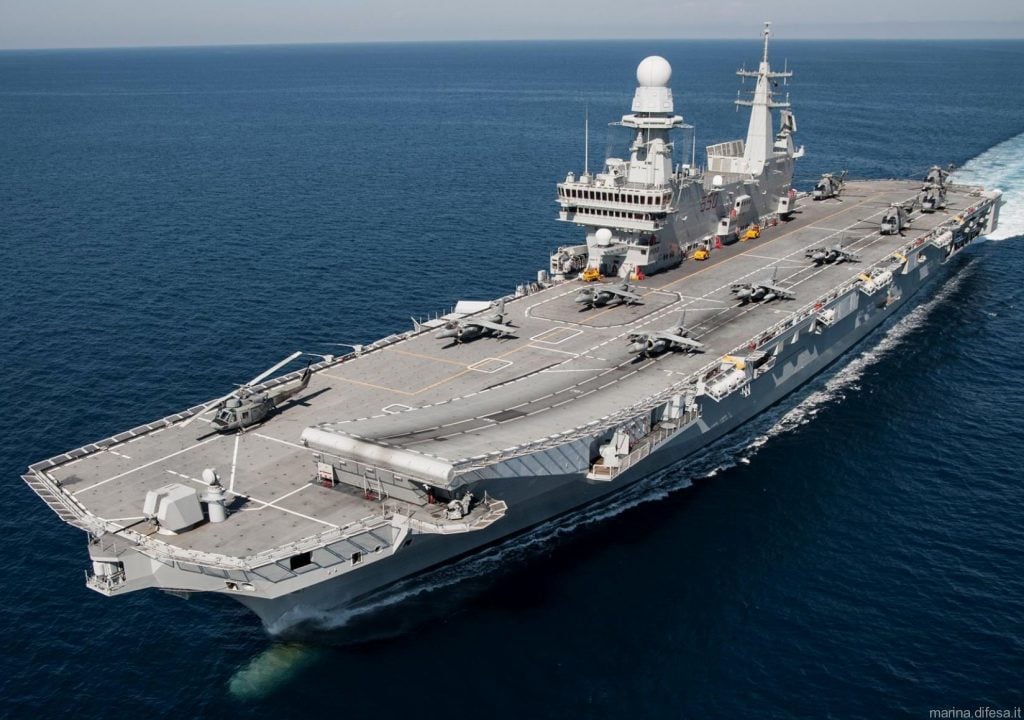
This carrier has a 232.6-meter-long flight deck and can accommodate up to 20 aircraft, including AV-8B Harrier, JSF, EH101, AB212, NH 90, and SH3D helicopters. Additionally, Cavour has a large hangar area and can hold up to 24 main battle tanks. Italy’s Cavour aircraft carrier is a versatile and combat-ready vessel, contributing to the nation’s maritime power.
12. Juan Carlos I, Spain
Juan Carlos I, an aircraft carrier of the Spanish Navy, stands as the largest ship ever constructed in the history of the Spanish Navy. Launched in September 2009 and commissioned in September 2010, this carrier has a length of 230.8 meters and a beam of 32 meters.
With a displacement of 27,079 tonnes, Juan Carlos I has a range of 9,000 nautical miles at a speed of 15 knots.
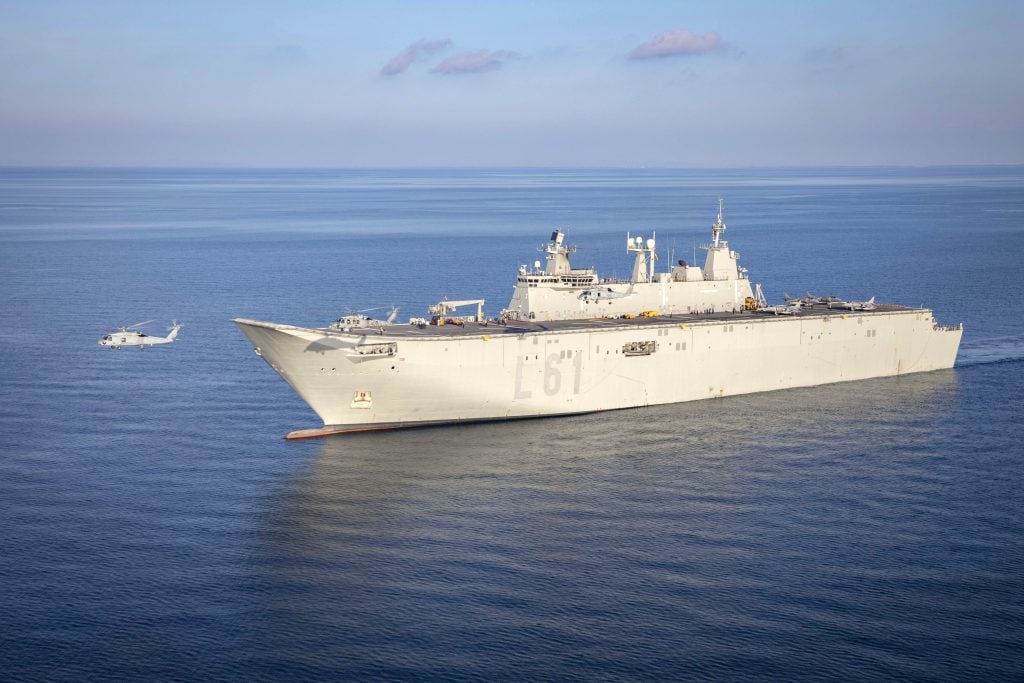
Juan Carlos I features a 202-meter flight deck with a ski-jump ramp and is equipped with AV-8B Harrier II aircraft. The carrier has 11 decks, including a floating deck, heavy deck, hangar, medium deck, and flying deck.
It can accommodate up to 1,400 personnel, including 890 embarked forces and 247 crew members. Designed for amphibious operations, joint force projection, disaster relief work, and humanitarian assistance, Juan Carlos I showcases Spain’s commitment to versatility and maritime capabilities.
13. Giuseppe Garibaldi, Italy
Giuseppe Garibaldi, an Italian aircraft carrier, holds the distinction of being the first through-deck ship constructed for the Italian Navy.
This vessel is also the first Italian vessel designed to operate fixed-wing aircraft. Commissioned in 1985, Giuseppe Garibaldi has been a part of several combat operations off the coast of Libya, Afghanistan, Kosovo, and Somalia.
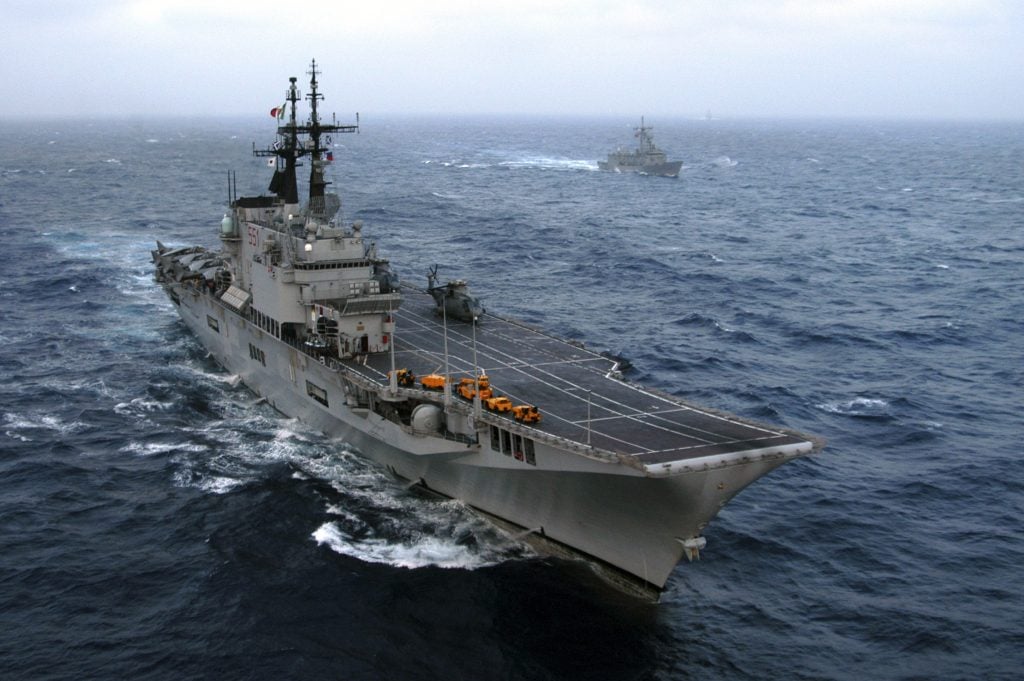
With a length of 180.2 meters and a beam of 33.4 meters, Giuseppe Garibaldi has a full-load displacement of 14,150 tonnes and a top speed of 30 knots.
The carrier has a flight deck measuring 174 meters in length and 30 meters in width, allowing it to accommodate approximately 18 aircraft. Giuseppe Garibaldi showcases Italy’s commitment to maintaining a capable and versatile naval force.
14. HTMS Chakri Naruebet, Thailand
HTMS Chakri Naruebet, the flagship of the Royal Thai Navy, is Thailand’s only aircraft carrier. Inspired by the design of the Spanish aircraft carrier Príncipe de Asturias, HTMS Chakri Naruebet was launched in 1996 and commissioned into the Royal Thai Navy in 1997.
This carrier holds immense pride for Thailand, as it is the first aircraft carrier operated by a Southeast Asian country.
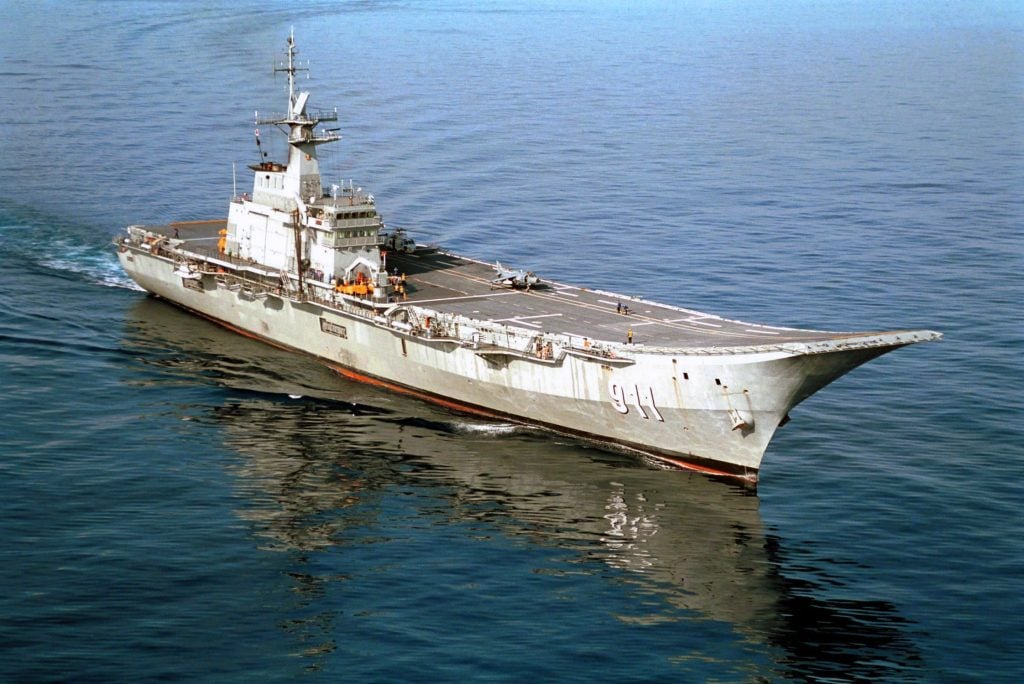
With a length of 182.65 meters and a beam of 30.5 meters, HTMS Chakri Naruebet has a range of 10,000 nautical miles at 12 knots and can attain a maximum speed of 25.5 knots. It can carry up to 675 troops and features a flight deck measuring 174.6 meters in length and 27.5 meters in width.
Designed for vertical take-off and landing aircraft and helicopters, HTMS Chakri Naruebet serves as a flagship, commanding the naval fleet during warfare, air defense, and combat operations.
15. TCG Anadolu, Turkey
TCG Anadolu is a remarkable assault ship that can also be configured as a V/STOL (Vertical/Short Take-Off and Landing) aircraft carrier. Named after Anatolia, which forms the majority of the Turkish landmass, TCG Anadolu was commissioned in April 2023. This vessel is designed to meet all the requirements of the Turkish Armed Forces, including long-distance military combat and humanitarian relief operations.
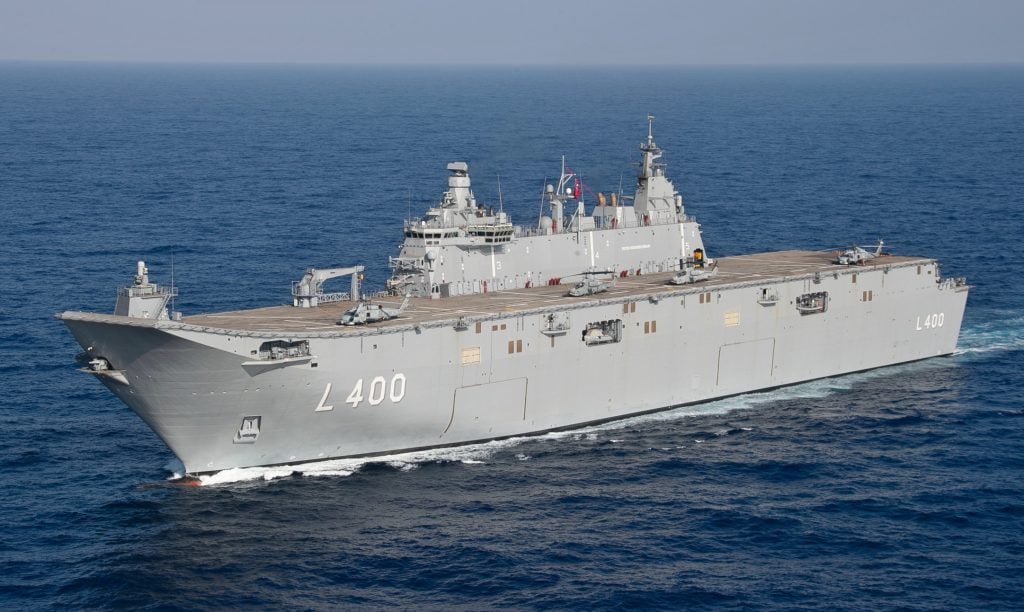
TCG Anadolu is the world’s first drone carrier, showcasing Turkey’s commitment to technological innovation and self-sufficiency. This vessel was built using local resources, with 70% of its construction completed over a period of seven years. With a length of 231 meters and a beam of 32 meters, TCG Anadolu has a displacement of 27,079 tonnes and a draught of 6.9 meters. This carrier can carry helicopters and features advanced munitions and a long-range search radar system. TCG Anadolu symbolizes Turkey’s ambition to become a dominant maritime power and a force to be reckoned with.
10 Best Fighter Jets in the World
Conclusion
Aircraft carriers are undoubtedly a vital component of modern naval warfare, serving as floating air bases capable of power projection and humanitarian aid. The top 15 best aircraft carriers in the world showcase the technological prowess, engineering marvels, and ambitions of their respective nations. From the USS Gerald R Ford Class, the largest and most advanced carrier, to TCG Anadolu, the world’s first drone carrier, these vessels represent the epitome of naval power.
As countries continue to invest in military expenditure, the development of new aircraft carriers is expected to continue. However, it is crucial for nations to prioritize sustainable technologies and minimize the environmental impact associated with these massive vessels. By doing so, countries can maintain a powerful naval presence while preserving the health of our oceans.
Frequently Asked Questions
What is the world’s largest aircraft carrier?
The USS Gerald R Ford Class holds the title of the world’s largest aircraft carrier. With a displacement of 100,000 tons, it is a testament to the United States’ commitment to naval supremacy.
Which country has the most aircraft carriers?
The United States operates the highest number of aircraft carriers, with a total of eleven carriers in service. France and Japan come next, with four carriers each.
What is the oldest carrier in the US Fleet?
The Nimitz Class carriers, with their impressive size and capabilities, continue to serve as the backbone of the US Navy. While the USS Enterprise was decommissioned in 2017, the Nimitz Class carriers remain operational, making them the oldest carriers in the US fleet.
Does Russia have any Aircraft Carriers?
Russia currently operates one aircraft carrier, the Admiral Kuznetsov. Although it is undergoing repairs and maintenance, Russia plans to extend its life by another decade and ensure its operational readiness post-2024.
Which is the most advanced aircraft carrier in the world?
China’s Fujian aircraft carrier stands out as one of the most advanced carriers in the world. With a displacement of 80,000 tons, it features catapults, straight flat decks, and arresting devices, marking a significant leap in China’s naval capabilities.

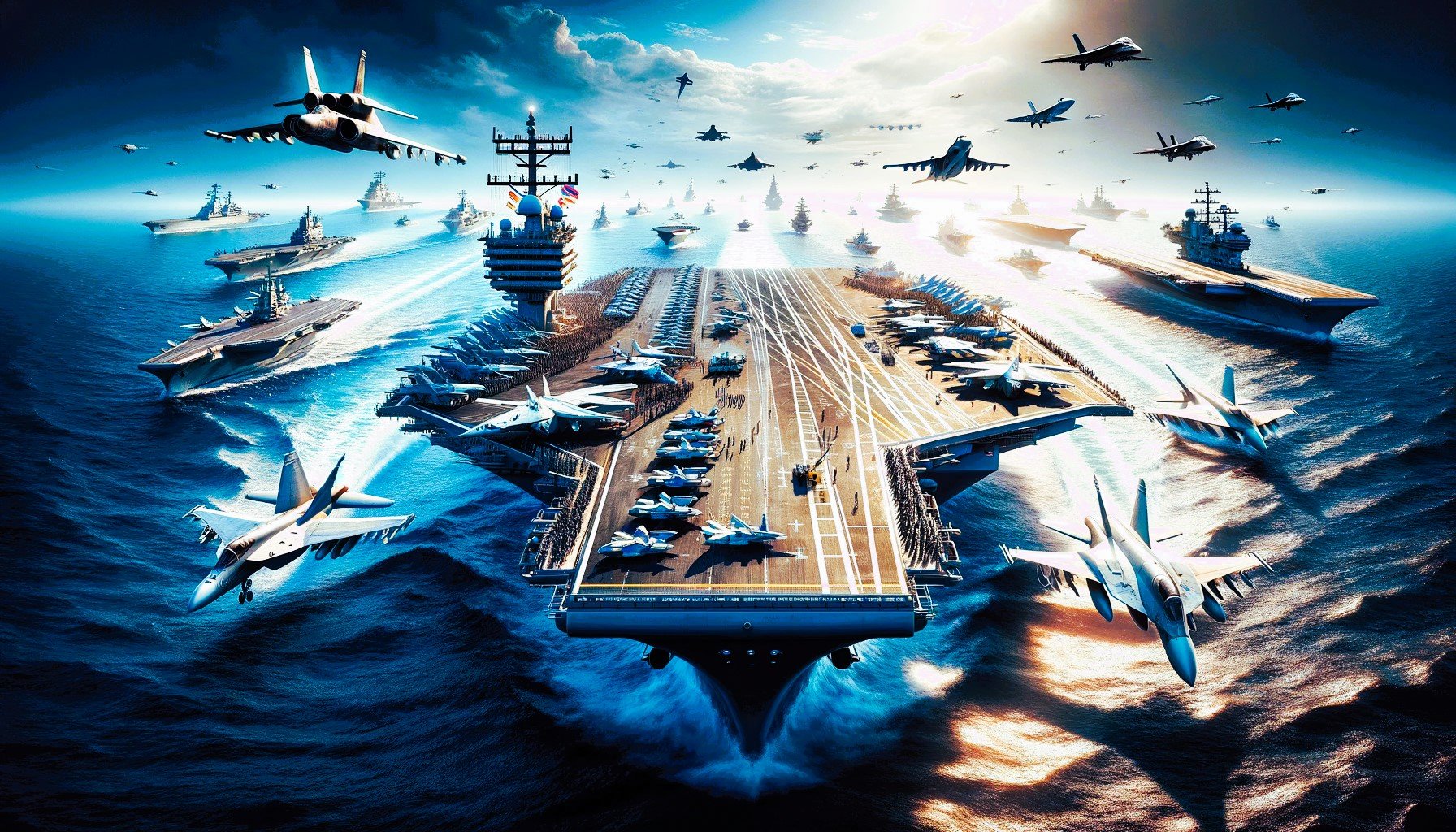

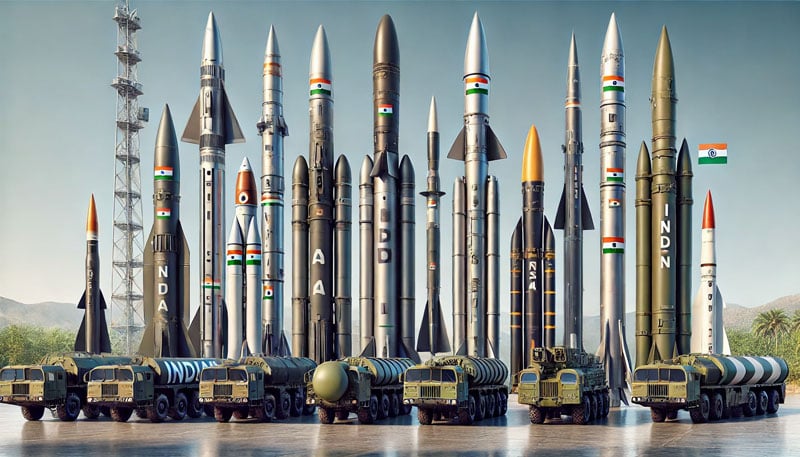

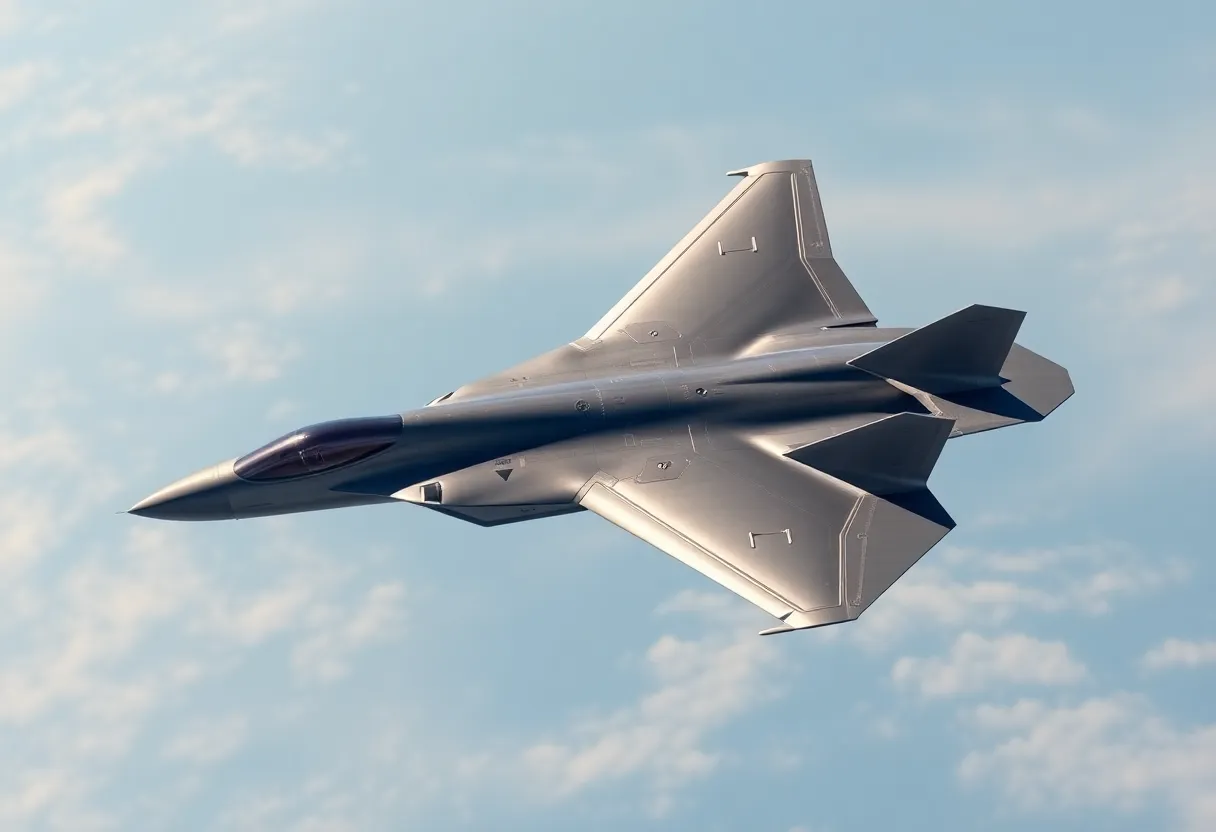

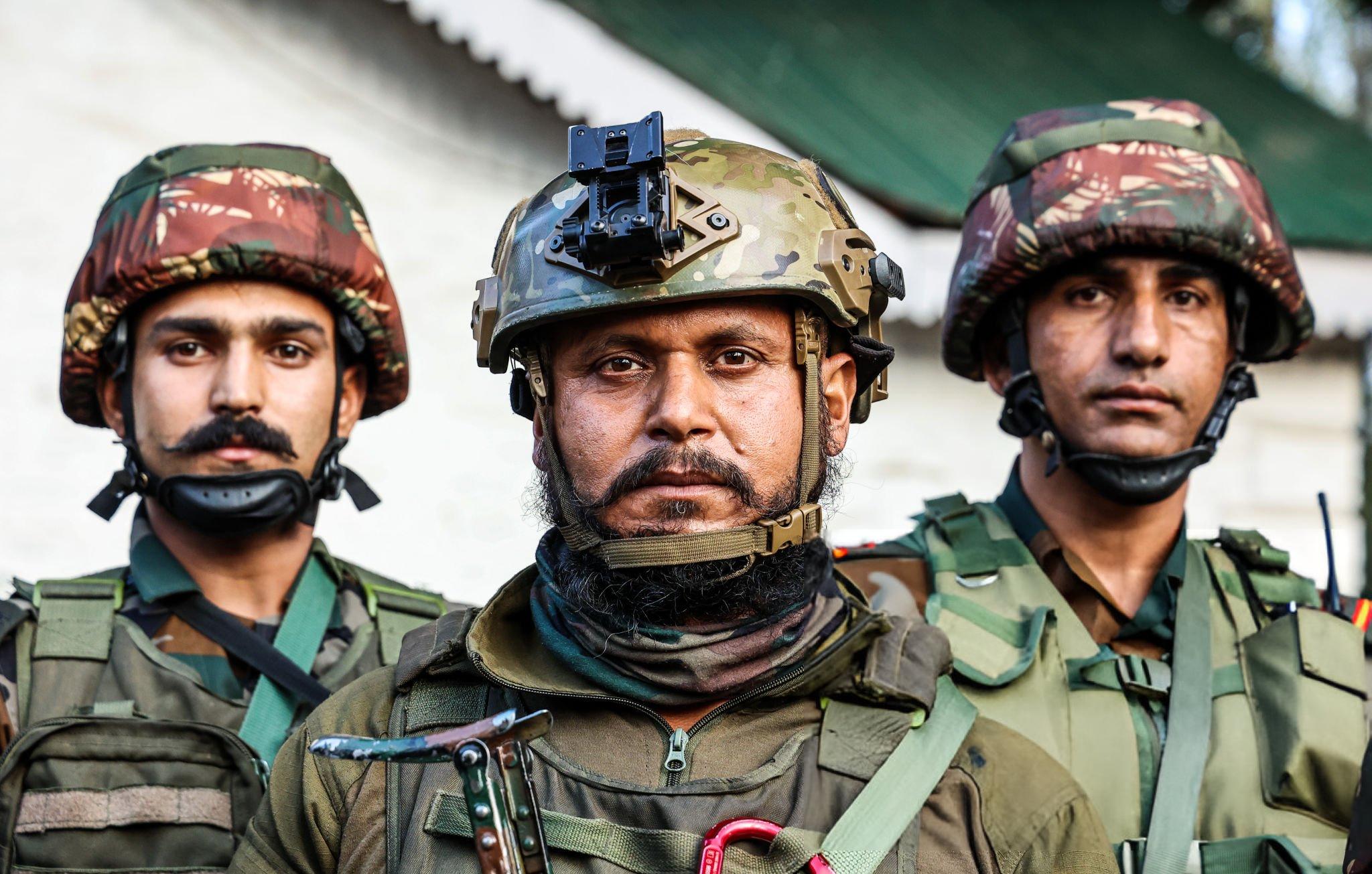
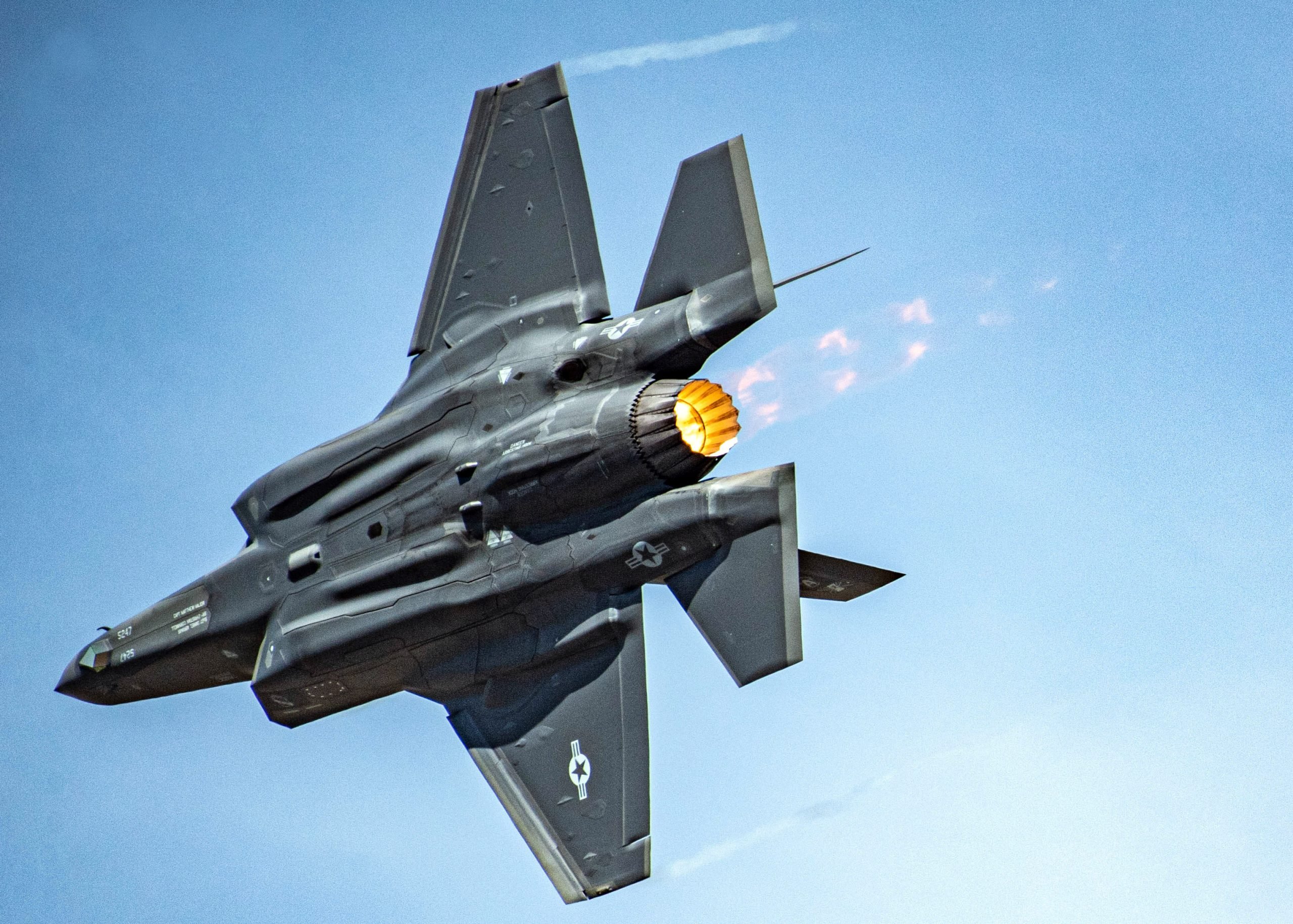





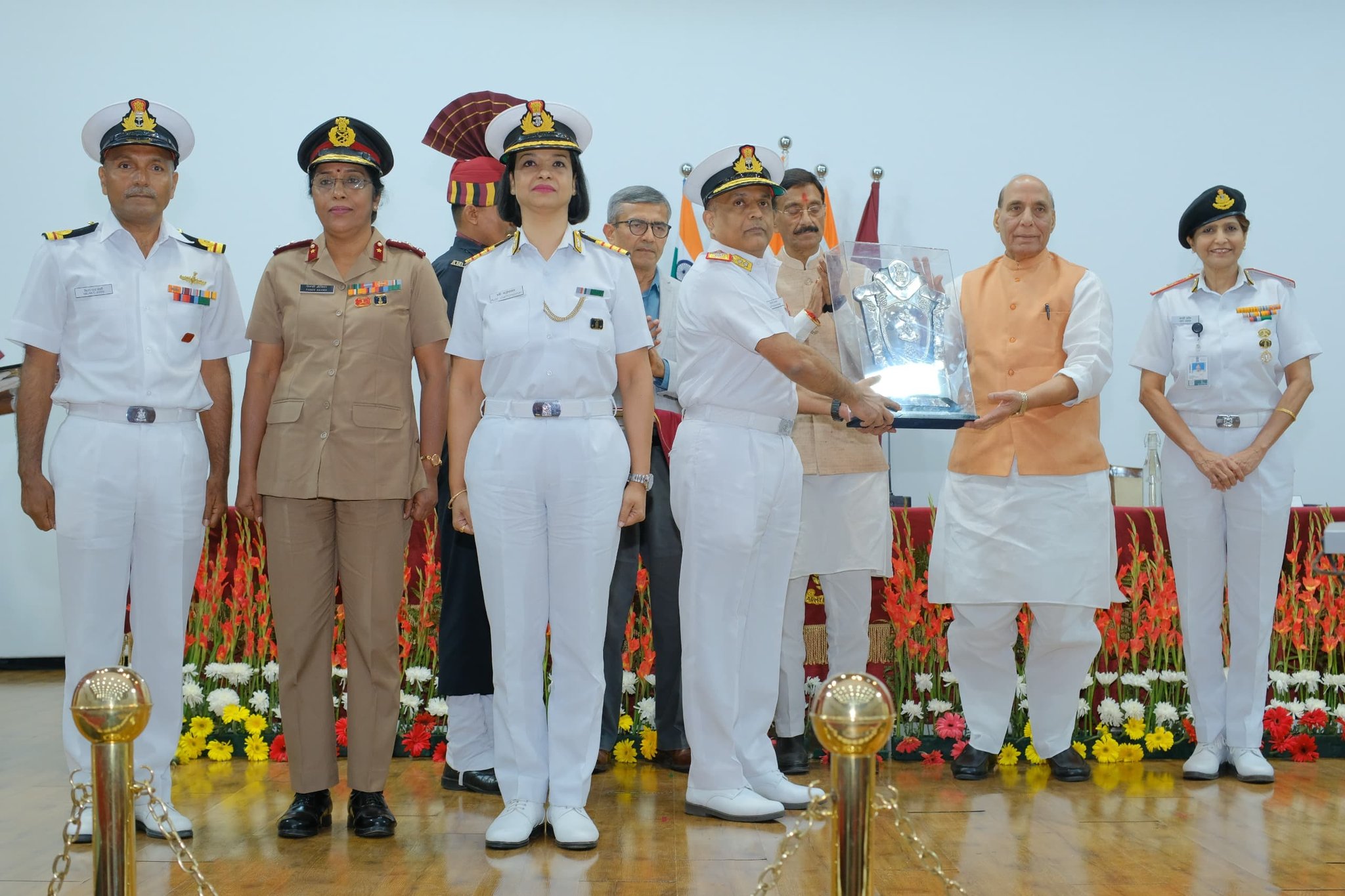

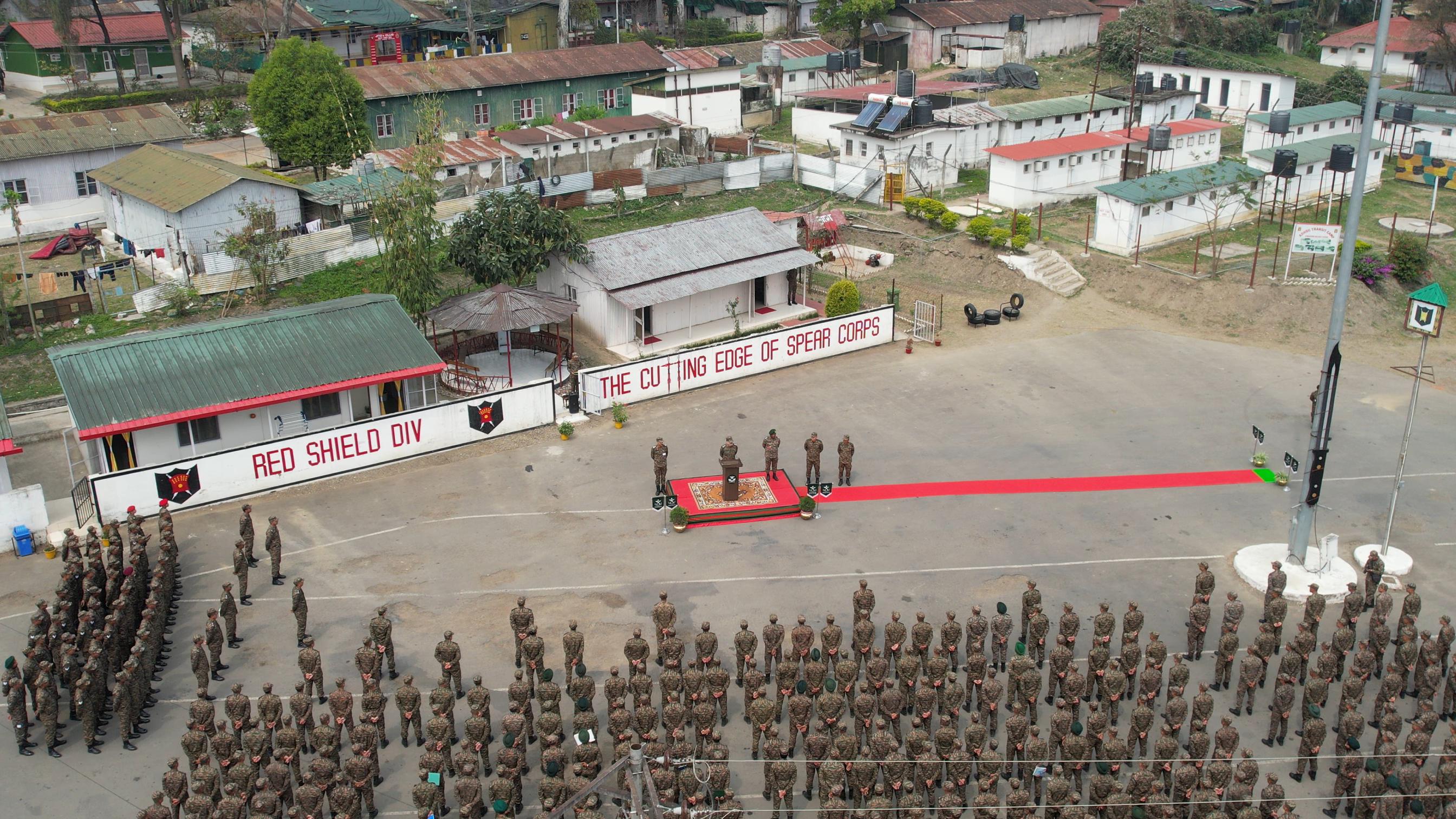


I’m sorry but to place the Charles de Gaulle in the 9th place is more than strange. You forgot to say that it is the only nuclear powered aircraft carrier after the US’s ones with very deterrent fighters: the Rafale Marine. Nothing to compare with the Russian”s one or the Chinese or Indian’s ones that aren’t catobar. The Fuijan should be in better place….The QueenElisabeth is a joke!!!